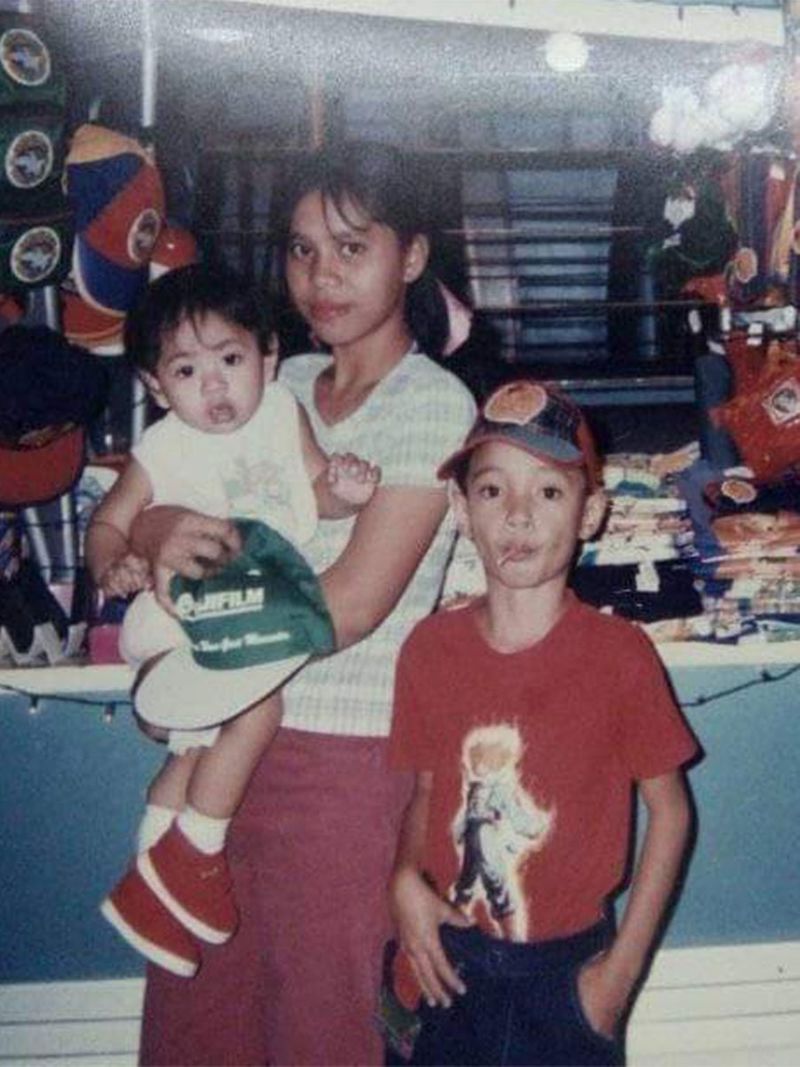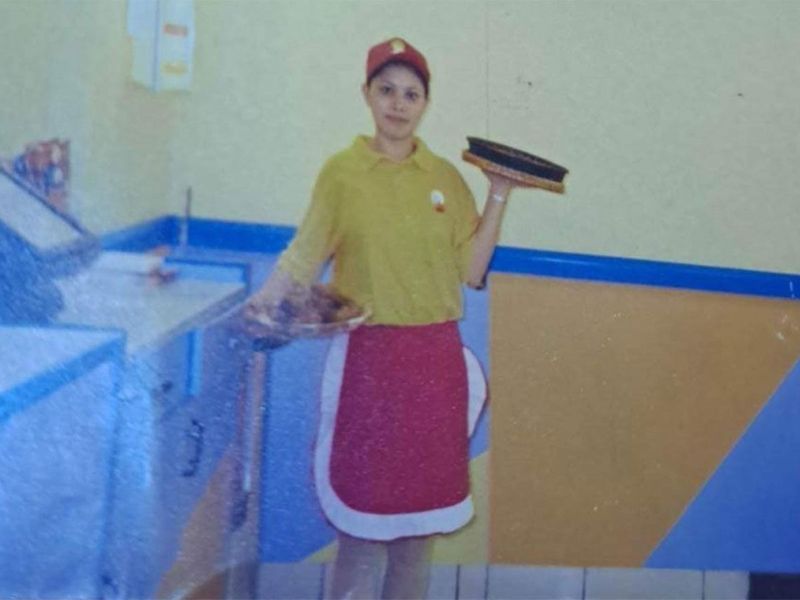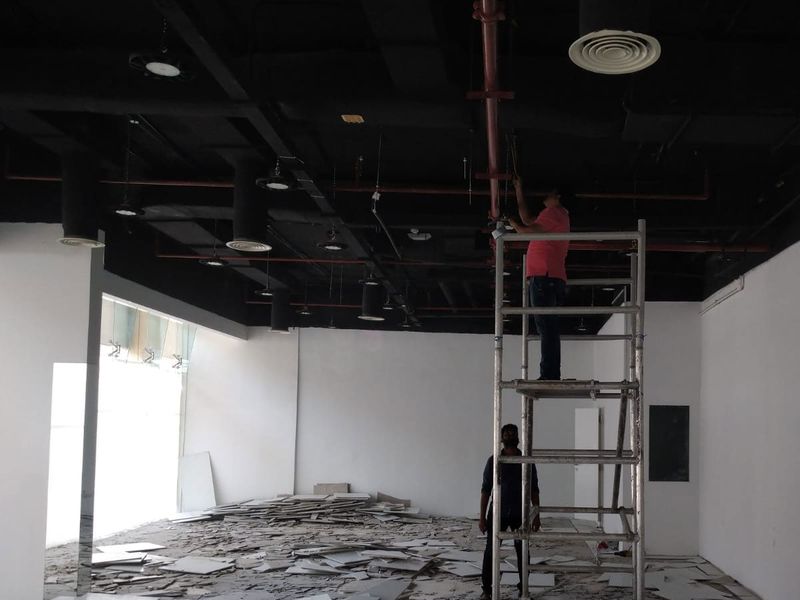
Dubai: To most people, #Mukbang might just be another South Korean social media trend that went viral, but for Dubai-based Filipina expatriate, Jenny Raet, it was what made her rise from the ashes like a phoenix.
Jenny who once was forced to sell garbage in the Philippines to afford a meal, literally, rode the Hallyu wave to success in the UAE.
The hashtag that went viral during the pandemic, saw Korean vloggers consume large portions of food for millions of views. For Jenny, who had just lost her job during the pandemic, the trend sparked an idea. With the help of her husband, she decided to use the trending word and concept to open a Korean restaurant in Abu Dhabi, called Mukbang Shows Korean Restaurant. From then on, there was no looking back.
Today, she owns three restaurants in the UAE – two in Abu Dhabi and one in Dubai. All three restaurants are buzzing with customers, with people waiting outside in queues on some days.
But this success did not come easy to her. Every time she looks back at her childhood, Jenny has tears in her eyes.
She remembers herself, as a six-year-old girl, praying on her knees: “God please bless us... [to survive].”
Speaking to Gulf News in an exclusive interview, the 42-year-old restaurateur wept as she recalled her childhood in a little tin-sheet-roofed house in Manila’s Doctor Village in the Philippines.
“It’s called a village, but the place we lived in was like a slum area, our family was poor… there was no water or electricity… every day we had to carry water in containers from far,” said Jenny, who lived with her parents and eight siblings – two brothers and six sisters.
“My mother was a dressmaker and father a carpenter. Usually by Wednesday, there was no food in the house. I remember how my siblings and I would go to our neighbours’ houses asking for food. Sometimes we would be lucky to get some moringa leaves from our neighbours, and we would add it to noodles.”
While she was still six, Jenny’s dad got into an accident at work: “He and some of his colleagues fell off a construction site… My dad was the only one who survived, but he was extremely injured and bedridden for months. This made the situation at home worse as the source of income for such a large family stopped.”
This forced Jenny to start working at the age of six.
Selling scraps for food
“On many days, I had to join my brothers to collect garbage and make some money off by selling scraps just to have enough money for all of us to eat and continue paying our school fees,” she said.
“When we would go to school, I remember being angry that I didn't have a single good pair of socks or shoes....
“But, even though our life was very hard, we were a happy loving family. We would count the smallest blessing. After days of not having proper food, even bread felt delicious. If mum would treat us to a bottle of soft drink on salary day, it would be a celebration for us.”
By the time she turned nine, Jenny started joining her mother to help neighbours with laundry for 150 pesos (Dh9) per day.
“It helped me make enough money to get through high school.

“I remember when I was around 15 years old, one day I returned home from school, only to find that we don’t have a house anymore. The government had demolished the slums in our neighbourhood.
“Huge bulldozers and big trucks had crashed into our home… I will never forget that… all our things were wet because it was a rainy day….”
Jenny and her family moved into a relative’s house.
“The house was too tiny… I started telling myself, I don’t like this life and started praying to be successful someday.”
Jenny feels that her childhood was perhaps the reason she became independent, and succeeded in life.
“I always wanted to get out of this situation where we didn’t have money. It motivated me to find ways to make and save money,” she said.
“When I went to college, I started selling donuts at the bus station during my free time to make some extra money.”
Moving to the UAE
In 2002, her father passed away and a year later, a pastor in the local church, helped Jenny find a job in the UAE. She was 21 years old.
It was here that her life began to gradually change.
“I got a job at a restaurant where I worked for Dh1000. I started saving money.”
At the restaurant waiting tables, from 2003 to 2005, Jenny managed to save Dh19,000. She did so while helping colleagues in need and sending money back home.

“They gave me a nickname – they started calling me National Bank of Jenny,” she said.
During this time, Jenny also got married.
In 2005, she left her job and went back to the Philippines to give birth to her first child.
“I left my first child in the Philippines and returned to the UAE in 2007. I started working in a salon, again.”
But, as the establishment was not doing too well, Jenny and her colleagues would not get paid their full salary.
In 2008, Jenny had her second child.
“I had two children depending on me, so I started looking for part-time jobs. The salon was in a villa, so I would clean the villa from 7 to 11am, work at the salon till 7pm and then do some part-time cleaning jobs.”
But, the money was not enough.
“Like the Bible parable of the persistent widow, who kept returning to the king to ask for justice, I kept turning to God for a better job,” she said.
Later that year, she passed the interview for a sales job, with a salary of Dh2,500. It was at this time that she also found the entrepreneur in her.
“From 2007 to 2014, I started helping people find living space, to make some extra income. It helped me recognise my gift to handle finances and I saved a lot of money. I started setting targets for how much to save every year. I wouldn't eat out too much or buy expensive things.”
Soon, Jenny had saved enough to invest in a wedding events shop. “I had saved up almost Dh200,000. Instead of putting it in a bank, I decided to invest it in a business that would give me an extra source of income.”
In 2014, Jenny moved to fashion retail as a sales executive and a couple of years later, she became a business development executive. While her investment and side business were also giving her good returns every month.
“I was one of the top sellers in my company, and soon got a better opportunity in facilities management. My salary increased.”
But, this streak of luck was short-lived.
The year 2017 brought many challenges. The side business was not bringing her any more income and Jenny had to file for a divorce due to an abusive marriage.
Having had her third child, Jenny now became the sole provider for three children.
“I became depressed and unhappy, the cost of living was too high. Rest was a word that became a distant dream. I was broken, both emotionally and financially.
“My relationship with my children also suffered damage due to the divorce,” she recalled with tears filling her eyes again.
But, there was hope at the end of the tunnel. In 2019, she met Douglas, an American expatriate living in the UAE.
The two became close friends and realised they had similar interests.
“We never stopped talking, just a few months into meeting me, he visited me in the Philippines when I went there to meet my children. Douglas changed my life, he made me happy. So, we decided to get married.”
The next year, some more bad news came in the shape of a global pandemic. With strict restrictions put on public events, Jenny’s investment in the wedding event company crashed and she lost her job.
“My investment crashed, the side business had already died, and I lost my job, but the rent still had to be paid and I still had three children depending on me.”
Saved by a social media trend
After a year of using up her saved finances, in 2021, it was a trending hashtag that saved Jenny.
“I was walking down a street in Abu Dhabi with Douglas one day when we saw that many small restaurants had opened up. We wondered if it would be a good idea for us to open a small restaurant,” she said.
The two started discussing options. Douglas was already a follower of the viral Mukbang trend.
“He had a YouTube channel for Mukbang, and he followed other Mukbang content creators. It was a trend with millions of views. So, we thought, why not use that concept? There was also a growing interest in Korean culture. People wanted to visit South Korea but travel restrictions were still in place,” she explained
“I observed the needs of the market. I had never travelled to Korea but I used my business development skills to find out more about the country and its attractive features. I found out that many people love South Korean street food and barbecue.”
They finally decided to open a restaurant serving Korean barbecue and popular street food and call it Mukbang Shows Korean Restaurant.
When I discussed with friends, many doubted if I would succeed in opening a Korean restaurant, being a non-Korean.
But, the two words that were familiar to K-culture fans were enough to set the ball rolling. And she made sure the chefs hired were those trained in Korean cuisine.
The financing of the first restaurant
“As Douglas was working in the UAE, he was able to apply for a loan. We began with a loan for Dh270,000. The licence for the first branch in Al Muroor, Abu Dhabi, cost me around Dh20,000. When we started setting up, we realised that the money we had borrowed from the bank would not suffice. So, we went back to top up the loan for Dh600,000.”
Jenny used Dh600,000 for the restaurant setup and saved Dh200,000 for any oncoming expenses.
“Our first branch, which opened in January 2022, had 14 tables. Just a few days into opening, we already had a huge queue of customers. I was crying happy tears because I didn't know where the customers were coming from.”
Meanwhile, the marketing was being handled by Douglas, who previously worked in the Information Technology division of the military, in the US.
“I have some knowledge in Search Engine Optimisation (SEO), which I started using,” he told Gulf News.
Jenny added: “Our videos and posts started trending on Google. Bloggers started discovering us and when they posted about us, they would get tens of thousands of views with many comments asking for the location.
“Just the words Mukbang and Korean, and related hashtags started giving us an exceptional number of views.”
Soon, the restaurant saw multinational customers.
“From Arabs to Americans and from Europeans to Indians, we had customers from all around the world,” she added.
“We started rolling our profits back into the business completely. In just three months, we had recovered the initial capital that we owed the bank.”
By April, when Jenny checked the bank, she had turned a millionaire. “We checked our earnings and by April we had made Dh1.3 million.”
Four months later, as they were considering opening another branch, a friend approached them offering to invest.
“For our second branch in Electra in Abu Dhabi, we found an investor… a friend who had seen the business succeed, approached us. So, we signed a profit-sharing contract of Dh500,000 for five years. The new branch had 21 tables.
“From a small entrepreneur, the goal now became to conquer the Middle East market. It was a big dream.”
By November 2022, the couple had Dh2.2 million in the bank, which they used to open their next branch in Dubai.
“For the Dubai branch that had 200 seating, it cost us Dh400,000 per year for rent, Dh400,000 for the interior fit-out, Dh200,000 for the furniture, Dh150,000 for the kitchen equipment. The licence cost us Dh40,000. The visa and labour charges for the staff were additional,” she added.

“I hired managers to help me at the branches and moved to Dubai because the demand was bigger here. We hired 30 staff for Dubai, making our total staff count across the UAE, 65.”
While her chefs are all either trained by Korean chefs or have worked in Korean restaurants in the past, Jenny added that she tries to help people looking for jobs, as waiting staff.
“I even have more than one member of the same family, like brothers, hired in two branches. The salaries of my staff are competitive as per the market in each location, and we provide free meals plus surprise bonuses.”
Her staff says that some days, Jenny can be seen doing the dishes with the staff or mopping the floors.
“I work with them. Sometimes when they are tired I hug them, even if the customers are right there. When you love your staff, they love you.”
Sharing the blessing
Jenny and her husband are also using their profits to help families back in the Philippines, who can’t afford necessities. “We work with organisations to help with children’s education, especially with the Palawan tribes and in Coron, where the land is so infertile and barren. We contribute to a feeding program. We are also sponsoring four students for their education. And, helping many others with school supplies.
“My target is 10 children to be sponsored per branch. I just want to share my blessings, because I have been in that situation. It’s where I grew from….”
Note: The story was first published in May 2023












